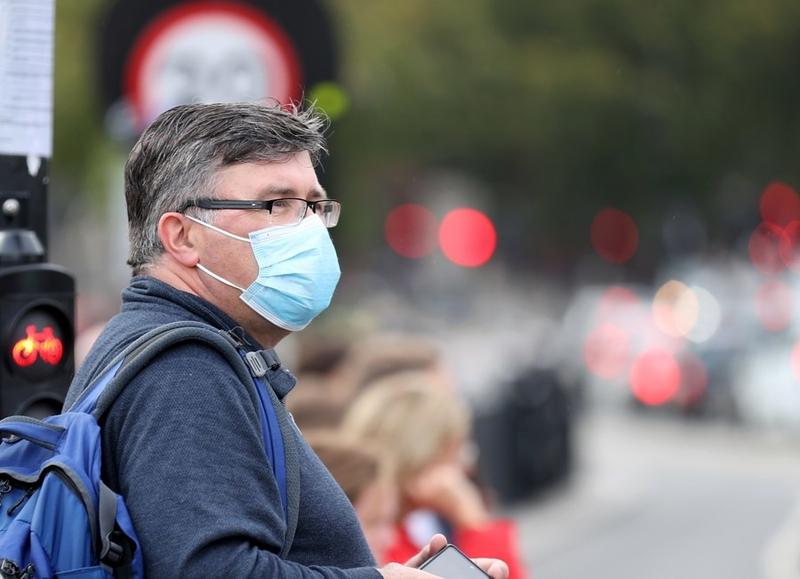Evolving variants may pose challenges to current vaccines, WHO committee warns
 A man wearing a mask is seen near the Westminster Bridge in London, Britain, Oct 14, 2022. (LI YING / XINHUA)
A man wearing a mask is seen near the Westminster Bridge in London, Britain, Oct 14, 2022. (LI YING / XINHUA)
The World Health Organization said on Oct 19 that COVID-19 is still a Public Health Emergency of International Concern (PHEIC), the WHO’s highest alert level.
The announcement came although the number of weekly deaths is almost at its lowest level since the pandemic began.
The WHO’s International Health Regulations Emergency Committee said after its quarterly assessment meeting last week that despite a decline in severe cases of COVID-19, and the falling number of weekly deaths, deaths from COVID-19 nevertheless remain high compared with other respiratory viruses.
It also warned of COVID-19-related complications and post-COVID-19 conditions, with the full impact of these still not completely understood. The outbreak could also evolve during the upcoming Northern Hemisphere winter season, the committee said.
Meanwhile, the current gaps in global surveillance of COVID-19 have hindered early identification and evaluation of the virus’ evolution. With the virus expected to continue evolving, the committee said the genetic and antigenic characteristics of future variants cannot yet be reliably predicted. Evolving variants may pose challenges to current vaccines and therapeutics, the committee warned.
“Given the above considerations, the committee concurred that continued coordination of the international response is necessary,” and considered that “the situation remains dynamic and requires frequent reassessments, and that the termination of the PHEIC, when considered feasible, should be implemented as safely as possible.”
The committee recommended there should be three key priorities in the future: strengthening surveillance and achieving vaccination targets for at-risk groups; continuing to increase access to affordable therapeutics; and strengthening pandemic preparedness planning, while continuing to protect the most at-risk groups.
A fresh autumn wave of COVID-19 infections has begun in many European countries, and experts are calling for strengthened vaccination efforts and tighter health measures as cases are set to keep rising this winter.
Greece confirmed 55,242 cases in the week of Oct 10-16, an increase of 8 percent compared to the previous week. Of the new weekly infections, 21 percent are reinfections, the National Public Health Organization reported on Oct 18.
The report also said that during the week of Oct 10-16, 1,351 COVID-19 patients were admitted to hospitals, up 23 percent compared to the previous week.
In the Netherlands, the number of people hospitalized with COVID-19 has continued to rise, reaching its highest level since April 15. The National Institute for Public Health and the Environment said new infections may rise sharply in the near future.
Dutch Health Minister Ernst Kuipers recently warned: “The current situation presents extra risks, especially for vulnerable groups of people. So stick to the basic advice and for the vulnerable: get the repeat vaccination shot to maintain your protection.”
Finnish National radio Yle reported earlier this week that the current rate of deaths caused by COVID-19 in Finland is five times the EU average. So far in October, the Finnish Institute for Health and Welfare had reported 261 deaths.
“Although we are not where we were one year ago, it is clear that the COVID-19 pandemic is still not over. We are unfortunately seeing indicators rising again in Europe,” said a joint statement released by European health agencies on Oct 12.
“Preparedness measures need to continue in the European region, we should not let our guard down,” said a statement by WHO European Regional Director Hans Kluge, European Center for Disease Prevention and Control Director Andrea Ammon and European Commissioner for Health and Food Safety Stella Kyriakides.
The potential co-circulation of COVID-19 and seasonal influenza will put vulnerable people at increased risk of severe illness and death, they said.
On Oct 17, the Italian health ministry recommended the use of new bivalent COVID-19 vaccines for the third booster shot for vulnerable people, which should be administered 120 days after the second booster. The third booster shot is recommended for elderly people aged over 80, vulnerable people over 60, and residents of care homes.
In Belgium, health authorities have drawn up a winter plan to contain the latest wave. The plan is based on a new booster vaccination campaign, and the return of mask-wearing in certain places.
The Belgian plan recommends that people with fragile health should wear FFP2 masks on public transport and in busy indoor places.
Steve Russell, Britain’s National Health Service director for vaccination and screening, said this winter “could be the first time we see the effects of the so-called ‘twindemic’ with both COVID-19 and flu in full circulation”.


